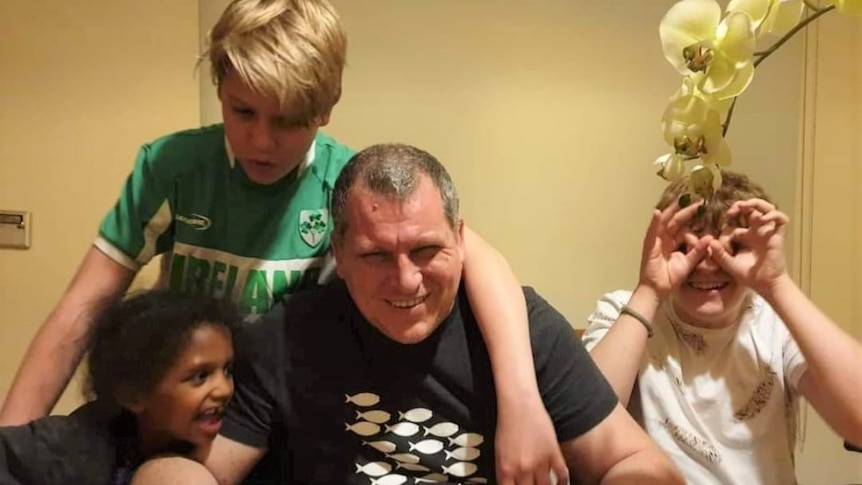There are serious fears for the health of an Australian man languishing in an overcrowded Baghdad jail, with doctors arguing he needs urgent surgery to treat multiple suspected skin cancers.
Key points:
- Robert Pether’s doctors say he need seven potential cancers cut out
- Pether’s wife says there is a “marked difference” in the new government’s approach to his case
- Labor’s Peter Khalil says he holds out hope the Iraqi government will grant Pether clemency
Robert Pether, 47, has been behind bars in Iraq since April last year, found guilty of what his family and legal team described as trumped-up fraud charges.
United Nations investigators have raised concerns Pether, and his Egyptian colleague, Khalid Zaghloul, have been exposed to torture techniques while imprisoned.
Pether’s family spent nine months trying to get him access to medical experts in Iraq, after a photo of injuries on his back was sent to a doctor in Italy.
“His doctor was absolutely appalled at the state of him,” Pether’s wife Desree told the ABC.
“He’s got so many new moles on his back, he’s got a new mole on the same ear that he had a melanoma before, and it has changed significantly in the last few months.
“It’s displaying the same aggressive behavior as the melanoma that he had.”
He now needs to have seven potential cancers cut out but there is no guarantee he can access the care he needs in Iraq.
“Our doctors stated that he looks 74, not 47, and he looks very frail, like a frail old man,” she said.
“He’s completely grey, and his skin tone is grey.
“There’s also [the risk of] post-operative infection when he’s in a 14-foot cell with 22 other men.”
Pether’s doctor has gone so far as to write to Prime Minister Anthony Albanese.
Ms Pether said her husband was “absolutely terrified” about the situation, and his mental health was deteriorating.
“He’s in a really dark place,” she said.
“It’s really, really hard to be in a position where you have to talk him off of a ledge quite frequently.
“And for our 19-year-old son to get off the phone and be in tears because of the way his dad’s talking, and thinking that his father’s going to do something drastic, it’s really difficult.”
Pair face further charges
Pether, an engineer, had been working on the construction of the new $1 billion Central Bank of Iraq (CBI) headquarters in Baghdad, when he was arrested alongside his colleague Zaghloul.
In August last year, an Iraqi court found the pair guilty of deception charges which carried a $16 million fine and five years in jail.
Since then, the two men have been hit with further charges as CBI has tried to enforce further ends for delays in the project.
The case has been put off until later this month.
Ms Pether had been highly critical of the Morrison government’s approach to her husband’s case, saying her family felt abandoned.
She said there had been a “marked difference” in the approach of the new government.
“It’s chalk and cheese,” Ms Pether said.
“I’m hoping that they’re able to do something a little bit more significant … in respect to trying to get him out.”
In June, Mr Albanese spoke to his Iraqi counterpart, Mustafa Al-Kadhimi.
An official transcript of the conversation from the Iraqi government did not mention Pether’s case but sources have told the ABC the matter was raised.
The ABC has contacted Foreign Minister Penny Wong’s office for comment.
Diplomats working ‘around the clock’
Last week, Labor MP Peter Khalil took to his feet in federal parliament to raise Pether’s situation.
“The strain on Robert is terrible, but so is the pain of his family — the pain they’ve had to endure for over 16 months — his wife, Desree, and his children, Nala, Oscar and Flynn,” he told the House of Representatives.
“The Pether family have sold a property to help pay for Robert’s legal fees, and, I think, a car as well. All they want is Robert to return home safely.
“His daughter, Nala, draws pictures of what she plans to do with Dad when he gets out and is back home. Desree tells me it’s hard to keep the kids’ and Robert’s hopes up.”
Mr Khalil said diplomats were working “around the clock” on the case, and hoped the Iraqi government might grant him clemency based on his deteriorating health.
.
